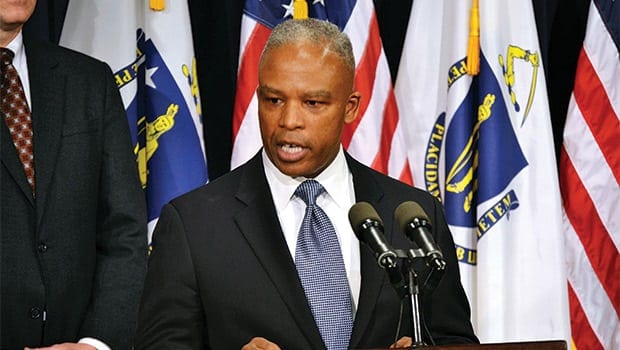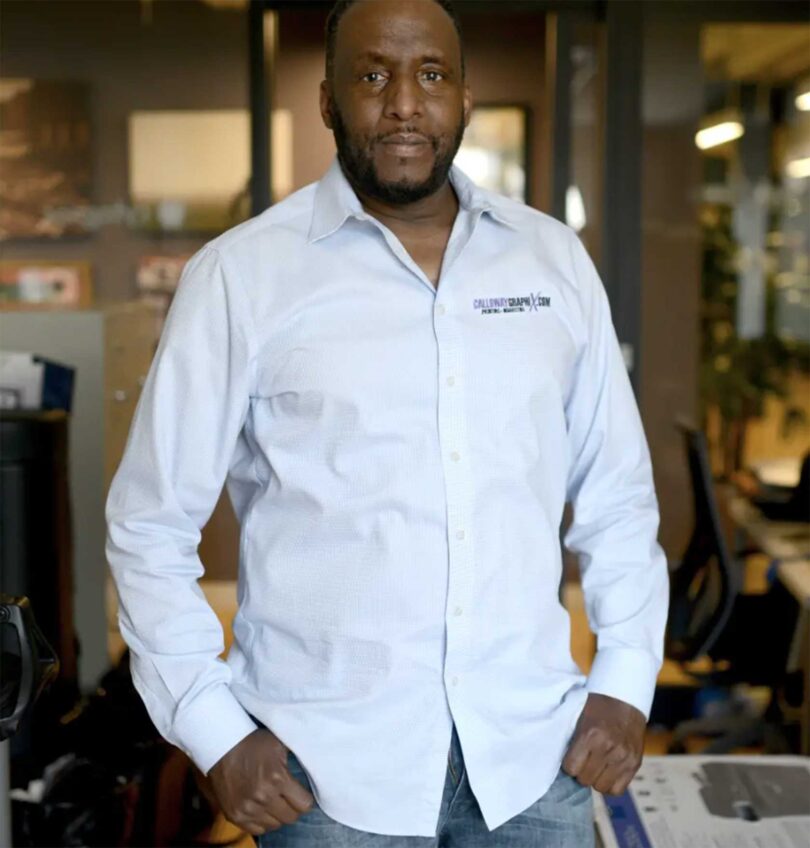A focus on job creation
Governor’s point man on workforce launches new initiatives

As Labor and Workforce Development Secretary, Ronald Walker II is a driving force behind the state’s efforts to create new jobs and provide opportunities for Massachusetts residents to compete in the state’s growing job market.
At a time that the state and the country are on a record streak of job growth, Walker is charging hard at a problem that still plagues the state and many of Boston’s neighborhoods — high unemployment rates in communities of color.
Born and raised in Mattapan, Walker says he feels his ties back to the community, so his seat up high in Baker’s administration does not distance him from the areas where unemployment still has a daily impact.
His office provides the data to show just how much of a battle there still is. While the overall unemployment rate now hovers around 5 percent, for African Americans, Latinos and Native Americans the rate is as high as almost 20 percent. These groups make up a larger number of the more than 160,000 still unemployed in Massachusetts.
Native Americans have the highest unemployment rate at 19.7 percent with an estimated 1,300 unemployed, but Latinos and African Americans tally the greatest numbers. Latinos have an unemployment rate of 11 percent with 27,000 unemployed and African Americans hit a rate of 10.7 percent for 24,400 out of work.
Looking at these numbers, Walker knows that the more than five years of job growth that has most employment pundits elated is not hitting home in Massachusetts in some of the places it matters most — and he wants to change that.
“We have to try and make sure that we are creating a pipeline to get individuals clear opportunities to get jobs from both large businesses and small businesses,” Walker said.
On paper, Walker has an almost dizzy array of initiatives, boards, cabinets and reports to try and make this happen. These include:
- The Workforce Skills Cabinet, which is developing legislative policies to ensure more training for workers in areas that have a high demand for labor.
- The Workforce Development Board, which is working directly with state employers to figure out what jobs need to be filled and how the state can help develop more workers to fill them.
- The Task Force on Economic Opportunity for Populations Facing Chronically High Rates of Unemployment, which is tackling the unemployment disparity in some communities.
As Labor and Workforce Development Secretary, Walker also oversees five labor and workforce development regulatory agencies: the departments of Unemployment Assistance, Career Services, Labor Standards, Industrial Accidents and Labor Relations. In addition, he also manages Commonwealth Corporation, a quasi-public state agency charged with administering work force training funds.
Walker is also acutely aware that to fix the problem these jobs efforts can’t just be paper tigers. And what that means more than anything is getting the money to make things happen on the street.
Early success
So far his efforts in this area have produced good results, such as $1 million to back job programs for those coming out of prison, $2 million for the Workforce Competitive Trust Fund to support underemployed populations and almost $3 million for apprenticeship programs.
In regards to the “chronically unemployed,” Walker has scored an even more impressive victory so far with $9.3 million in Workforce Skills Capital Grants to help 35 high schools, community colleges and vocational training programs prepare students for futures in high-demand industries looking for workers.
Ultimately, in the fight to help get more jobs to African Americans and Latinos and other underemployed communities, the task force that examined chronically high rates of unemployment came back with a major finding that education and training could be among the main solutions.
Case in point, you have online retail giant Amazon with 400 jobs at a distribution center in Fall River, but not enough qualified workers to fill the jobs. The state is currently working with Amazon to bridge the gap, but also using it as an example of the types of in-demand careers that workers need to be trained for.
“We are trying to make sure we work more closely with what I call the demand side of the equation, so we have to customize our approach to meet the needs of these new business opportunities,” said Walker.
He points out that other sectors such as manufacturing and technology also struggle to fill job needs.
“The manufacturing industry, and this is across the Commonwealth, if you talk to them they have major job opportunities that they need to fill with new, young workers that exist in every neighborhood in Boston and through the state,” Walker added. “We also initiated conversations with finance companies, with health care companies and with hospitals because they also, as they are growing, need to figure out ways to get more people in the pipeline.”
Gov. Charlie Baker has been vocal about the success of the work Walker and his peers have been doing so far. He said the Workforce Skills Capital grants would play a massive role in economic development by helping provide the skills needed for students and workers to connect with promising careers.
Strong demand
The good news is there many schools, community colleges and job training programs clamoring for the funding to help out. While the state was able to shell out $9.3 million in funding, they had requests for more than $18 million, so there is more work that can be done if Walker and his job proponents can find ways to throw more cash behind it.
Some of the local schools that received funding include English High School, North Bennet Street School and the New England Center for Arts and Technology.
Walker also has strong ties to the area’s small business community and because of this believes in the importance of small businesses in job growth, particularly in underserved communities.
Prior to being appointed to the Baker Cabinet, Walker was managing partner and president of Next Street, a merchant bank he co-founded to offer financial and business advisory services to underserved small businesses and entrepreneurs in urban areas. He also has retail and commercial banking experience from senior executive roles at Sovereign Bank, Fleet Financial Group and Bank of New England.
He is thrilled to see new businesses starting up in places like Dudley Square.
“I absolutely think there is a real value in growing small businesses in the neighborhoods where they are because as we all know they can hire from the neighborhood and then you start the economic model of reinvesting in your neighborhood,” Walker said.
His days in banking with small businesses have shown him that many of these startups struggle to find the employees they need to be successful. In addition to all his job efforts, he also points to the state’s chain of 32 career centers as crucial to working with small businesses to get them the employees they need.
“What we want to do is be the supply chain to make sure these businesses have the assets and people to make their businesses work,” Walker said.
At the end of the day, the Massachusetts economy is on the rise, but to Walker it only matters if it impacts all.
“We want to make sure that everyone shares that growth and I am concerned and interested in making sure that every neighborhood, every individual, shares in the growth that this Massachusetts economy is having,” he said.






